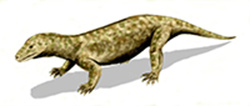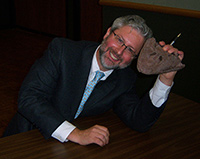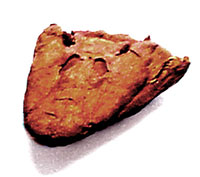TRANSLATE THIS ARTICLE
Integral World: Exploring Theories of Everything
An independent forum for a critical discussion of the integral philosophy of Ken Wilber
SEE MORE ESSAYS WRITTEN BY FRANK VISSER
Why We
Have Bodies
Evolution as an Experiment
in Body-Building
Frank Visser
"In some mysterious way, entire populations of mammals simply show up."
—Ken Wilber
There is one curious statement by Wilber on evolution that has stuck in my mind for some time and which I would like to elaborate on. In "Excerpt A: An Integral Age at the Leading Edge"[1], an excerpt from the book-in-progress "Kosmic Karma and Creativity"[2], wich was posted online back in 2006, Wilber discusses the co-arising of individual and collective phenomena.
Then he digresses to the field of evolutionary theory:
Even evolutionary sciences support this conclusion, in that they all agree on (even if they cannot explain) the fact that there are no first instances in evolution. When the first instance of a new species arises—for example, the first mammal—it never arises by itself; what first shows up is an entire population of mammals. It makes sense if you think about it. For a new species to arise, there must occur dozens of major beneficial mutations. The odds against that happening are of course astronomical; but worse, the same dozen mutations must occur in another animal of the opposite sex; and then, on the entire world-wide planet, they must find each other; and then mate, and then their offspring have to survive and mate—and the odds of all that happening are of course off the scale of the believable and even the possible. No, in some mysterious way, entire populations simply show up—and that means, the insides and outsides of the singular and the plural arrive on the scene together: the four quadrants simultaneously arise and mutually tetra-evolve, as we have been saying all along. [different types of emphasis in the original]
(How do entire populations simply show up? What "mechanism"can possible account for that? The short answer is: Eros. See the endnote on involutionary givens.(30) But whatever we decide on the "how" of it, the factual "what" of it is that the inside and the outside of the singular and the plural arrive on the scene simultaneously: the quadrants tetra-evolve.) (p. 96)
That end note 30 refers to another endnote, 26, a mini-essay called "On the Nature of Involutionary Givens". Here we read, among other things, under sub-paragraph (1) Eros:
"The universe is on fire with an unquenchable thirst for God."
—Ken Wilber
This drive—the drive of Eros—appears, to the third-person perspective of humans at or beyond the yellow wave [nowadays recolored by Wilber as "teal"] as a drive toward self-organization in all complex holons, a drive to create order out of chaos, a series of dissipative structures that eat energy and create unified form: against all scientific sensibilities (which see only "its" without intentionalities), and against every known law of physics (which imagines that "its" only run downhill), the material universe appears to be actively organizing itself into higher and more complex systems. Scientifist scratch their heads. How can that be? The universe is self-winding. The universe seeks higher unions. the universe has a drive for self-organization. The universe... well, let us say plainly what the it-perspective misses: the universe is on fire with an unquenchable thirst for God. But however you conceive that Eros, this drive to order-out-of-chaos, this astonishing autopoiesis at the very heart of matter, it is an uncontested pattern in evolution, and a pattern that cannot be explained by evolution itself. (p. 129)
This piece of good old-fashioned Wilberese mesmerized me for a long time, but this subject of the "emergence" of new organisms in evolution can be approached from a very different, much more scientific (and at the same time more interesting) angle.
A CLOSER READING
If you think this amounts to beating a dead horse, it is. But somebody has to do it.
But let's first do a closer reading of the above paragraphs. They exhibit the typical Wilberian mentality which I criticized in my ITC 2010 Paper "The 'Spirit of Evolution' Reconsidered" in fuller detail. If you think this amounts to beating a dead horse, it is. But somebody has to do it.
First, we encounter the bogus chance-argument which Wilber uses to discredit the scientific point of view. Chance mutations are supposed to be the explanation for evolutionary phenomena, and since they are extremely unlikely to occur in the scenario described by Wilber, it is usually implied—and here also explicitly stated—that "something else" must be governing this whole process, i.e. Eros. In reality, random chance and non-random selection are put forward by scientists from Dawkins to Mayr to account for evolutionary phenomena. This makes all the difference. And to avoid word quibbling up front: please note that "random" in this context means "without foresight" and "non-random" means that not just anything gets selected, but only that which provides an evolutionary advantage.
Instead, Wilber opts for a mysterianism that supposedly takes care of unexplained phenomena—explaining exactly nothing in the process.
There's also the typical hubris involved where Wilber frames scientists ("they all agree, even if they can't explain") as conceding that "an entire population of mammals simply shows up". No scientist in his right mind will state it like this. There is of course a trivial meaning of Wilber's statement about the co-arising of indivdual and collective: any being that exists in the plural sense will have a kind of collectivity from the very start, together with his fellow-beings. But he seems to imply that during evolution, new species have emerged en masse, as if driven by some mysterious choreographer.
Never mind that the transition from reptiles to mammals (which represent whole classes, not just species), took millions of years to complete—as was the case in the previous transition from amphibians to reptiles. Never mind that there have been both reptile-like amphibians and mammal-like reptiles, as can be found extensively in the fossil records.
Says Wikipedia on "The Evolution of Mammals":
 Restoration of Procynosuchus,
Restoration of Procynosuchus,
a member of the cynodont group,
which includes the ancestors of mammals
The evolution of mammals has passed through many stages since the first appearance of their synapsid ancestors in the late Carboniferous period. By the mid-Triassic, there were many synapsid species that looked like mammals. The lineage leading to today's mammals split up in the Jurassic; synapsids from this period include Dryolestes, more closely related to extant placentals and marsupials than to monotremes, as well as Ambondro, more closely related to monotremes. Later on, the eutherian and metatherian lineages separated; the metatherians are the animals more closely related to the marsupials, while the eutherians are those more closely related to the placentals. Since Juramaia, the earliest known eutherian, lived 160 million years ago in the Jurassic, this divergence must have occurred in the same period.[3]
Of course, Wilber is not interested in these petty empirical details. He's interested in writing about his grand scheme of things, putting his opponents in a corner, and only incidentally mentioning scientific or empirical details where they fit in (but never where they contradict his scheme).
Once he has convinced his readers that Eros must be behind the evolution of life and of the Kosmos, he again suggests that scientists are baffled by these phenomena ("Scientists scratch their heads. How can this be?"). However, they can very well explain why evolution seems to go up stream and seems to defy the laws of entropy. Against every known law of physics? Never mind that our Sun pours in tons of energy on this planet, which some simple organisms have managed to use to their own advantage. No known law of nature is broken here.
Further, that the process of complexification in evolution is uncontested is definitely not true, though a majority of scientists might subscribe to some qualified form of directionality or progress. And can it really not be explained by evolution itself, as Wilber bluntly states?
Either challenge Darwisism head on, in public, involving the people that really matter in this field of science, or leave the subject at rest, I would say. Wilber prefers to handle these matters in a few paragraphs, which will not even interest his readers, and definitely will not convince the specialists.
So let's ask the scientists. Are they baffled by the emergence of new classes in evolution?
YOUR INNER FISH
 Neil Shubin with a
Neil Shubin with a
specimen of Tiktaalik
One of the most enlightening books on evolution I have read in the past years has been Your Inner Fish, written by paleontologist-anatomist Neil Shubin.[4] Shubin has been a leading figure in unearthing one of the most important "missing links", those between fish and the earliest land animals. Based on our knowledge of geological eras and land distribution they hypothesized that in the Northern parts of Canada around Ellesmere Island fossils of these primitive animals could most likely be found. After years of fruitless digging they found what they were looking for: remains of a transitional animal between fish and reptile: Tiktaalik:
Tiktaalik lived approximately 375 million years ago. Paleontologists suggest that it is representative of the transition between non-tetrapod vertebrates (fish) such as Panderichthys, known from fossils 380 million years old, and early tetrapods such as Acanthostega and Ichthyostega, known from fossils about 365 million years old. Its mixture of primitive fish and derived tetrapod characteristics led one of its discoverers, Neil Shubin, to characterize Tiktaalik as a "fishapod".

You read it well, it took millions of years for natural selection to produce all these anatomical transformations.
The first chapter of the books tells the story of these fascinating discoveries. If that wasn't exciting enough, Shubin takes us on a tour through our own bodies, showing how taken-for-granted senses like eyes and ears have their roots deep into our evolutionary past—even to those primitive invertebrate ancestors that didn't even have eyes and ears in the first place! Isn't it wonderful to look at your own wrists and finger bones and realize these were already present in the bony finns of some prehistoric fish?
By patiently searching for intermediate species biologists dispell the notion that evolution goes through unexplainable transformations that are caused by mysterious higher powers or forces, such as the Wilberian Eros. As the reviewer of The Guardian stated it:
As Shubin makes clear, evolution does not proceed in mighty anatomical jumps but through a process of gradual change, by transforming—very slightly—a gene, cell or bone so that it acts to a new purpose. In this way, a new species is eventually created, albeit one that still carries the hallmarks of its evolutionary predecessors, an inner connection that can—and often does—stretch over the aeons, from fish to humans.[5]
Furthermore, Shubin gives insightful pointers such as seeing the whole of complex evolution as an experiment in "body-building". For two billions of years, bacteria ruled the earth and continue to do so quite well, to this very day. Only about half a billion years ago, the frantic explosion of life forms took place that resulted in multi-cellular organisms such as plants, animals and funghi—bodies proper. Shubin calles it the biological equivalant of "a perfect storm" and suggests that it could have not occurred earlier due to climatological reasons.
We, then, have bodies, because it turns out to be advantageous to have them: both for predators and prey it paid to have teeth, muscles, bones, shields and the like. In our very bodies we can read into the distant past, and understand why we have hernia's, suffer from obesity, heart problems, suffer hickups, and more. Even our microbial past turns up in mitochondrial ailments. For sure, after reading Shubin you look differently at your very own hands...
Then there are the major discoveries of genetics where light is thrown on the mechanisms in which genes play a major role in forming different types of senses, such as eyes, across whole classes of beings, i.e. mammals and insects. Even more mysterious, in the most primitive or organisms both eyes and ears where governed by the same genes (explaining why some eye defects in humans go hand in hand with hearing disorders).
And finally, Shubin gives us a true feeling or our connectedness with our evolutionary past, by pointing out that by being alive, we relate to the first living organism, by having a backbone we relate to the fish that went on land, by having color vision we relate to the mammals that took to eating fruits, and by walking upright, we relate to all the species of the homo genus that preceded the celebrated homo sapiens. Literally all of evolution is embodied in our very being. In a deep sense, we're all modified fish.
Reading Shubin is a perfect antidote to Wilber's intoxicating statements about mysterious processes behind evolution, that only he is able to perceive, and that supposedly provide explanations where scientists fail. Is anyone within the integral community caring for this more sobering approach? Given the recent Wilber tributes, celebrations and biography projects the chances are slim indeed.
Looking forward to reading Shubin's latest: The Universe Within: Discovering the Common History of Rocks, Planets, and People [6]—even though the "within" part in this book title will have to be taken with a grain of salt, no doubt.
NOTES
[1] "Excerpt A: An Integral Age at the Leading Edge", ©2006. See: http://www.kenwilber.com/writings/read_pdf/83
[2] Kosmos Trilogy, volume 2. Recently Wilber announced that he had finished this book which is now called Sex, Karma, Creativity. See: http://www.kenwilber.com/blog/show/754. The original work-title was "Kosmic Karma and Creativity". I don't know if that passage I am quoting above is part of the final version of this book, seven years now after the Excerpt A was posted online, but something tells me Wilber still stands by it.
[3] See Wikipedia on "The Evolution of Mammals", http://en.wikipedia.org/wiki/Evolution_of_mammals
[4] N. Shubin, Your Inner Fish: A Journey into the 3.5-Billion-Year History of the Human Body, Pantheon Books, 2008.
[5] Robin McKie, "So who are you calling fish-face?", The Guardian, The Observer, Sunday 10 February 2008
[6] Neil Shubin, The Universe Within: Discovering the Common History of Rocks, Planets, and People, Pantheon, Hardcover January 2013, Paperback October 2103.
|

 Frank Visser, graduated as a psychologist of culture and religion, founded IntegralWorld in 1997. He worked as production manager for various publishing houses and as service manager for various internet companies and lives in Amsterdam. Books: Ken Wilber: Thought as Passion (SUNY, 2003), and The Corona Conspiracy: Combatting Disinformation about the Coronavirus (Kindle, 2020).
Frank Visser, graduated as a psychologist of culture and religion, founded IntegralWorld in 1997. He worked as production manager for various publishing houses and as service manager for various internet companies and lives in Amsterdam. Books: Ken Wilber: Thought as Passion (SUNY, 2003), and The Corona Conspiracy: Combatting Disinformation about the Coronavirus (Kindle, 2020). 

